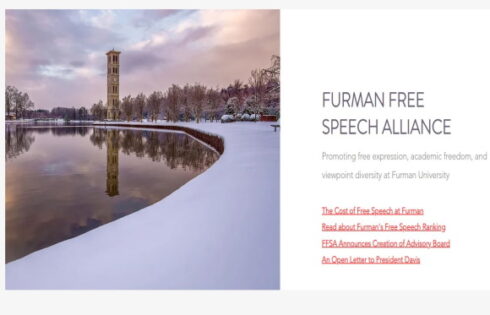
As the number of women in higher education continues to rise, free speech on college campuses declines, said Professor Samuel Abrams, a social scientist at Sarah Lawrence College.
Abrams determined the trend by analyzing the results of a nationwide survey of faculty conducted by the Foundation for Individual Rights and Expression, pointing out that compared to male counterparts, female scholars are more likely to agree with suppressing and punishing unpopular speech.
“Fifty-one percent of women professors reported that they could envision shouting down a speaker to prevent them from speaking on campus as being acceptable, compared to just 39 percent of men,” Abrams wrote in a March 24 piece for the American Enterprise Institute, where he serves as a senior fellow.
For white male professors who refuse diversity training, almost half of female professors “believe their male counterparts should face some sort of sanction,” he wrote.
“Thirty percent of female professors believe [the male] professors should be removed from the classroom until they comply. Seventeen percent of female professors believe that these male professors should be suspended until they comply. Two percent of female faculty even believe that their white male counterparts should be fired,” Abrams wrote.
In comparison, only 26 percent of male faculty think the professors should be punished, he wrote.
In an interview with The College Fix, Abrams said the survey results show that female professors are more supportive of mandatory diversity, equity and inclusion statements as well as silencing dissenting or controversial speech.
In contrast, he said, most male professors view DEI statements as a political litmus test and are less likely to support shouting speakers down.
Underscoring these findings is the fact that women — as students, faculty and administrators — now hold the majority share in higher education, he said.
Abrams, in his interview with The College Fix, said he is not highlighting the trend due to a “personal interest in gender” but rather seeks “to understand various cut points in society.”
He said recent election results and other data show that younger single women are overwhelmingly left-of-center, progressive and politically active, while older women and married women tend to be more centrist and conservative.
He said in reviewing the FIRE faculty survey, he sought to determine whether this trend played out on college campuses as well, where women make up about 66 percent of the university faculty.
“Thanks to this new very large-scale survey … over and over and over again the data showed, very disturbingly in my view, that when it comes to things like mandatory diversity statements … that women were overwhelmingly in support of those, whereas men were not,” he told The Fix.
Gender equity is important on campuses as is the subsequent viewpoint diversity that emerges. But men and women professors hold divergent views about open debate and discourse and the differences have powerful implications for expression https://t.co/boHeSElDIK @TheFIREorg @aei
— Samuel Abrams (@SamuelAbramsAEI) March 26, 2023
For those seeking a grant, job or promotion in higher education, “when one group says you have to write a statement that makes certain values and political and ideological leanings clear, that’s a litmus test,” he said.
Another point in the data that was “unambiguously clear,” he said, was that “while men absolutely generally do not believe that it is appropriate to shout down speakers to try to prevent speech, women are very supportive of it.”
FIRE’s summary of its results also pointed out that “male faculty, compared to their female counterparts, were significantly more likely to say that the ‘administration should defend the professor’s free speech rights’ after a controversy.”
The national survey of 1,491 faculty at four-year colleges and universities, conducted in 2022, also found that significantly more female than male faculty favor protecting against hate speech “even if this restricts speech not intended to be hateful.”
“…Meanwhile, significantly more male than female faculty supported restricting speech only where words are certain to incite violence.”
Abrams, in his interview with The College Fix, said DEI statements are increasingly being shunned by states such as Florida, Texas and North Carolina. Scholars “should not have to espouse allegiance to something to do your job,” the professor said.
Asked about the reaction from his colleagues, he said he has encountered a significant amount of criticism and backlash “when people don’t like what they see, they immediately attack. The amount of hateful inbounds I get because of it is incredible.”
Abrams said he believes that free speech in higher education can still be preserved and suggests several methods to preserve free speech.
According to Abrams, universities can address some underlying factors, such as what he terms “ideological signaling” or “ideological litmus tests,” “by eliminating hiring, tenure, or promotion grants associated with diversity, equity, and inclusion.”
Abrams said he also recommends universities provide mandatory orientation on free speech to faculty, much like mandatory sexual harassment orientation, to ensure scholars are educated on the First Amendment.
But unless the trends are reversed, Abrams wrote in his AEI piece, “Female faculty are far less likely than their male counterparts to support these hallowed and critical practices, and higher education will suffer as a result.”
MORE: Most college students won’t discuss controversial topics for fear of peer backlash: survey
IMAGE: Wave Break Media / Shutterstock
Like The College Fix on Facebook / Follow us on Twitter





Please join the conversation about our stories on Facebook, Twitter, Instagram, Reddit, MeWe, Rumble, Gab, Minds and Gettr.